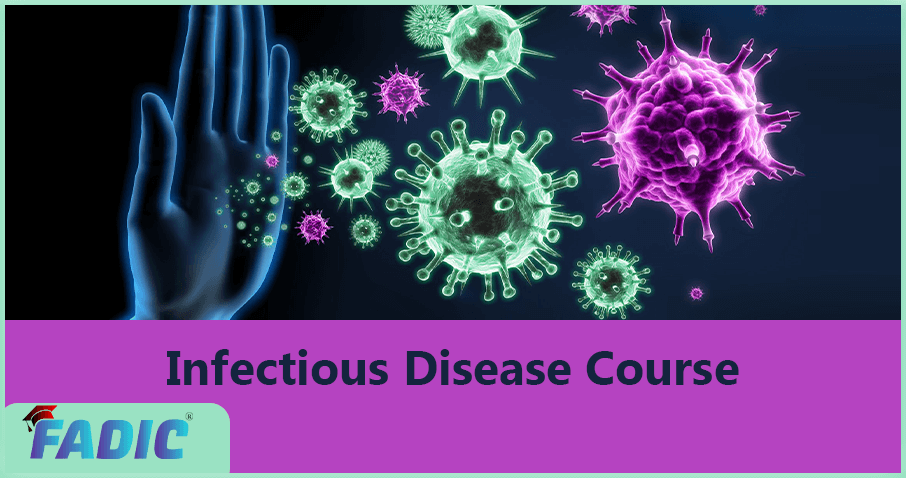
Why Join this Course?
Join the Infectious Disease Course to become a key player in combating antimicrobial resistance. Gain comprehensive knowledge, practical skills, and valuable insights from experts. Enhance your career prospects in healthcare with specialized knowledge in antimicrobial stewardship, and connect with professionals in this critical field for future growth and collaboration.
Overview
Infectious Disease Course
Welcome to the Infectious Disease Course (ID Course):
Week 1: Introduction to Antimicrobial Stewardship
- – Welcome to Antimicrobial Stewardship Program.
- – Clinical Quotes from Alexander Fleming’s Nobel Prize Lecture.
- – UK Report for 2050 Mortality of Antimicrobial Resistance.
- – History and Goals of Antimicrobial Stewardship.
- – Systematic Thinking in Potentially Infected Patients.
- – Antimicrobial Stewardship Algorithms.
- – FADIC Descriptive Study in Antimicrobial Stewardship Program.
- – Antimicrobial Stewardship Workshop 1.
Week 2: Antimicrobial Stewardship Guidelines – Part 1
- – Upper and Lower Respiratory Tract Infections (URTIs, CAP, HAP, VAP).
- – The Pathogenesis of Urinary Tract Infections: Acute cystitis, Acute Pyelonephritis.
- – Antimicrobial Stewardship Workshop 6.
Week 3: Antimicrobial Stewardship Guidelines – Part 2
- – Catheter-Related Bloodstream Infection.
- – Antimicrobial Prophylaxis & Surgical Site Infection.
- – Skin and Soft Tissue Infections (SSTI): Impetigo, Erysipelas, Cellulitis, Necrotizing fasciitis, Diabetic foot infection.
- – Antimicrobial Stewardship in SSTI.
- – Antimicrobial Stewardship Workshop 7.
Week 4: Antimicrobial Stewardship Guidelines – Part 3
- – Continuation of SSTI and Catheter-Related Bloodstream Infection topics.
- – OLD vs. NEW Sepsis Definitions.
- – Comparison of SIRS, SOFA & qSOFA.
- – Antibiotic Stewardship in Sepsis Management.
- – Antimicrobial Stewardship Workshop 9.
Final Project
- – Project 2 of Infectious Disease Guideline.
Join us on this comprehensive journey to master Antimicrobial Stewardship and make a significant impact in the field of Infectious Diseases.
Why Join the Infectious Disease Course?
- Joining the Infectious Disease Course offers numerous benefits and opportunities for professional development in the crucial field of antimicrobial stewardship.
Here are key reasons why this course is a valuable investment:
- 1. Addressing a Critical Global Health Issue: With antimicrobial resistance being a growing global concern, this course equips you with the knowledge and skills to make a tangible difference in this critical area of healthcare.
- 2. Comprehensive Learning Experience: The course covers a wide range of topics, from the fundamentals of antimicrobial stewardship to complex clinical scenarios, providing a thorough understanding of infectious disease management.
- 3. Practical Application: Beyond theoretical knowledge, the course emphasizes practical application through workshops and a final project, allowing you to apply what you’ve learned in real-world situations.
- 4. Expert Guidance and Mentorship: Benefit from the expertise of seasoned professionals in the field, offering mentorship, insights, and feedback to enhance your learning experience.
- 5. Enhanced Career Prospects: The skills and knowledge gained from this course are highly valued in the healthcare sector, opening doors to career advancement and specialization opportunities.
- 6. Networking Opportunities: Engage with peers and experts in the field, building a professional network that can be invaluable for future collaborations and career growth.
- 7. Flexible and Interactive Learning: The course is designed to cater to various learning styles and schedules, ensuring a comprehensive yet flexible educational experience.
By joining this course, you will be stepping into a vital role in healthcare, equipped to tackle challenges in antimicrobial resistance and contribute to better patient outcomes and public health standards.
If you have any inquiry, please contact WhatsApp.

-
Week 1: Introduction to antimicrobial stewardship
- Welcome to Antimicrobial Stewardship Program
- Clinical Quotes from Alexander Fleming Nobel Prize Lecture
- UK Report for 2050 Mortality of Antimicrobial Resistance
- Goals of Antimicrobial Stewardship
- History of Antimicrobial Stewardship
- Systematic Thinking in Potentially Infected Patients
- Antimicrobial Stewardship Algorithms
- FADIC Descriptive Study in Antimicrobial Stewardship Program
- Antimicrobial Stewardship Workshop 1
-
Week 2: Antimicrobial Stewardship Guidelines - Part 1
- Upper Respiratory Tract Infection “URTIs”
- Lower Respiratory Tract Infection “CAP”
- Lower Respiratory Tract Infection “Hap and VAP”
- The Pathogenesis of Urinary Tract Infections
- Acute cystitis
- Acute Pyelonephritis
- Antimicrobial Stewardship Workshop 2
-
Week 3: Antimicrobial Stewardship Guidelines - Part 2
- Catheter Related Bloodstream Infection
- Antimicrobial Prophylaxis & Surgical Site Infection
- Antimicrobial Stewardship in SSTI
- SSTI (Necrotizing fasciitis, and Diabetic foot infection)
- SSTI (Impetigo, Erysipelas, and Cellulitis)
- Antimicrobial Stewardship Workshop 3
-
Week 4: Antimicrobial Stewardship Guidelines - Part 3
- OLD Versus NEW Sepsis Definitions
- Comparison of SIRS, SOFA & qSOFA
- Antibiotic Stewardship in Sepsis Management
- Antimicrobial Stewardship Workshop
-
Final Project
- Final Project of Infectious Disease Guideline

 Log in
Log in Sign up
Sign up


